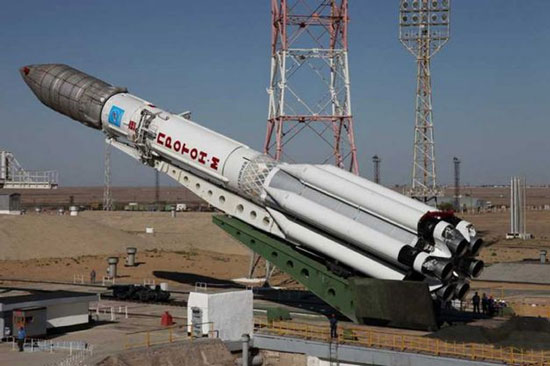Russian satellites disappear after launch
The Russian Federal Space Agency lost contact with a telecommunications satellite as soon as it was launched yesterday.
The AP reported the Express-AM4 telecommunications satellite launched by Proton-M boosters from Baikonur space airport in Kazakhstan. Russian officials describe Express-AM4 as the strongest telecommunications satellite they have ever built.

The Express-AM4 satellite and Proton-M rocket are included in the launch pad at Baikonur space airport on August 18. (Photo: AP)
The Russian Federal Space Agency said the boosters worked well, but an incident at the Briz-M propulsion device caused them to lose contact with the satellite. Experts are trying to resume contacting it.
Express-AM4 , launched into a geostationary orbit to undertake digital television broadcasts for regions in eastern Russia. Broadcasters claim failure in the Express-AM4 launch could slow the transition from television to digital television.
Many problems have occurred with the Briz-M pusher. The most recent incident occurred in February this year that left a Russian military telecommunications satellite missing.
In December 2010, another technical incident caused three Russian GLONASS-M positioning satellites to disappear. This event left Anatoly Perminov, head of the Russian Federal Space Agency at the time.
- Russian rocket launcher Soyuz carries 6 satellites
- Russian satellites fall immediately after launch
- Russia successfully launched the Dutch telecommunications satellite
- Video: Missiles carry satellites falling after launch
- Russia reused Soyuz after its failed launch
- Russia failed to bring 2 satellites into orbit
- Iran launched 3 satellites in the next 6 months
- Kazakhstan prevents Russia from launching satellites
- Russia launched three military satellites into orbit
- Russian missiles fell into the sea immediately after leaving the platform
- China will soon surpass Russia in the number of satellites operating in orbit
- Iran is preparing to launch 2 homemade satellites into orbit
 Van Allen's belt and evidence that the Apollo 11 mission to the Moon was myth
Van Allen's belt and evidence that the Apollo 11 mission to the Moon was myth The levels of civilization in the universe (Kardashev scale)
The levels of civilization in the universe (Kardashev scale) Today Mars, the sun and the Earth are aligned
Today Mars, the sun and the Earth are aligned The Amazon owner announced a secret plan to build a space base for thousands of people
The Amazon owner announced a secret plan to build a space base for thousands of people